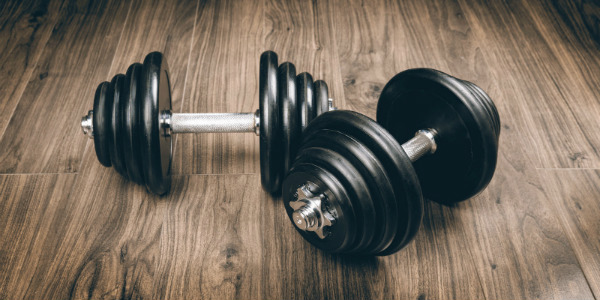Table of Contents
First, Traditional Cardio for Burning Calories
All those cardio machines at the gym spit out the number of calories you’ve burned during the workout. On the surface it can seem handy: “I burned 490 calories today! I can eat a cupcake!”
This is why doing cardio is such a popular method of burning calories. It appears to be more effective. Plus, people are still repeating the bad advice from the 1980s that you should spend 40 minutes in low-intensity cardio sessions if you want to lose fat.
Nutrition and the “calories in, calories out” myth aside, cardio by itself isn’t the most efficient way to burn away bodyfat. You can maximize your time in the gym better than that, even if your goal is only to lose bodyfat and you really don’t want strength or muscle.
How to Burn More Calories Long-Term
The best way to burn calories is to incorporate some weight training. Of course, freeweights and weight machines have no “calories burned” display, and for good reason: It’s more complicated than that.
On the surface, it appears as though lifting weights does not burn as many calories as cardio. You have to rest between sets because your muscles get tired. For this reason you can’t expend as much energy lifting weights for 30 minutes as you could with a steady cardio workout of 30 minutes.
Here’s the thing. Lifting weights increases your resting metabolic rate. Put simply, this means you continue to burn calories at an elevated rate long after your workout is done. This is due to the stress and recovery requirements. Over the months as you gain muscle, you will burn more calories even on days you don’t work out, because of the energy that muscle tissue requires just to sustain itself.
Crossfit’s Way of Combining Strength and Cardio
Crossfit doesn’t appeal to everyone, but one thing that has made Crossfit popular is the aspect of training for both muscle and endurance.
This kind of workout involves:
- A light warm-up, to get your muscles activated and help prevent injury.
- Strength training with weights, including lighter warm up sets
- A short, high-intensity workout, just 5-15 minutes, that leaves you lying out of breath on the floor in a pool of your own sweat.
- (after you catch your breath) Stretching.
This may take an hour from start to finish. It can be longer if you choose to add more strength training, or shorter if you are comfortable with cutting down your warm-up and stretching to the essential bits.
The high intensity portion best involves fast-paced bodyweight exercises or with a relatively light amount of weight that you can do for a lot of reps that work your heart and lungs more so than your muscles. Examples are battle rope movements, plyo box jumps, burpees, and kettlebell swings.
Other Ways to Combine Them
Athletes and trainers find that average people get burned out from constant Crossfit workouts. The impact of high-intensity workouts is rough on joints and can leave you feeling tired all the time. Your nutrition has to be on point, and even with a strict diet you can struggle.
Still, these kinds of short high intensity sessions are valuable. They’re usually done in the form of high intensity interval training, or HIIT, consisting of two or more short bursts of intense activity. Depending on how hard the activity is, this may be anywhere from 30 seconds to several minutes, and it’s easier to keep going if you involve 2 or more exercises in it that use different muscle groups so that your heart is being worked more than your muscles are getting tired out.
Many trainers now recommend fewer HIIT workouts and more strength training. They find that strength is what is lagging for most people. A stronger body helps you do the HIIT workouts more smoothly, intensely and with a lower risk of injury… thus burning more calories. Fewer HIIT workouts, such as only twice per week, is enough to keep improving your endurance and gives you time to recover from each session and not feel exhausted all the time.
You can create varied HIIT and strength workouts with a few basic pieces of Crossfit equipment.
If you like bike riding for cardio, you can still do some cardio. An Assault Airbike is particularly suited for cardio and HIIT workouts, because you can rapidly speed up and slow down without messing with buttons.

